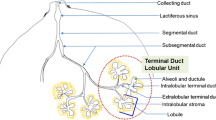Abstract
Breast cancer still remains a major problem in its incidence, morbidity and mortality; therefore, more effective strategies for its prevention are urgently needed. Retinoids, natural and synthetic derivatives of vitamin A, possess antiproliferative and proapoptotic properties, making them a promising class of chemopreventive agents against breast cancer. The efficacy of all-trans retinoic acid, 9-cis-retinoic acid, LGD1069 (Targretin, bexarotene), and N-(4-hydroxyphenyl)retinamide (fenretinide) as breast cancer chemopreventive agents is being studied. A better understanding of the molecular mechanisms of action of these agents should lead to improvements in their clinical application. In this review, we discuss the mechanisms by which retinoids exert their antiproliferative and apoptotic effects in breast cancer cells.
Similar content being viewed by others
Author information
Authors and Affiliations
Corresponding author
Additional information
Received 5 January 2004; received after revision 9 February 2004; accepted 12 February 2004
Rights and permissions
About this article
Cite this article
Simeone, AM., Tari, A.M. How retinoids regulate breast cancer cell proliferation and apoptosis. CMLS, Cell. Mol. Life Sci. 61, 1475–1484 (2004). https://doi.org/10.1007/s00018-004-4002-6
Issue Date:
DOI: https://doi.org/10.1007/s00018-004-4002-6




